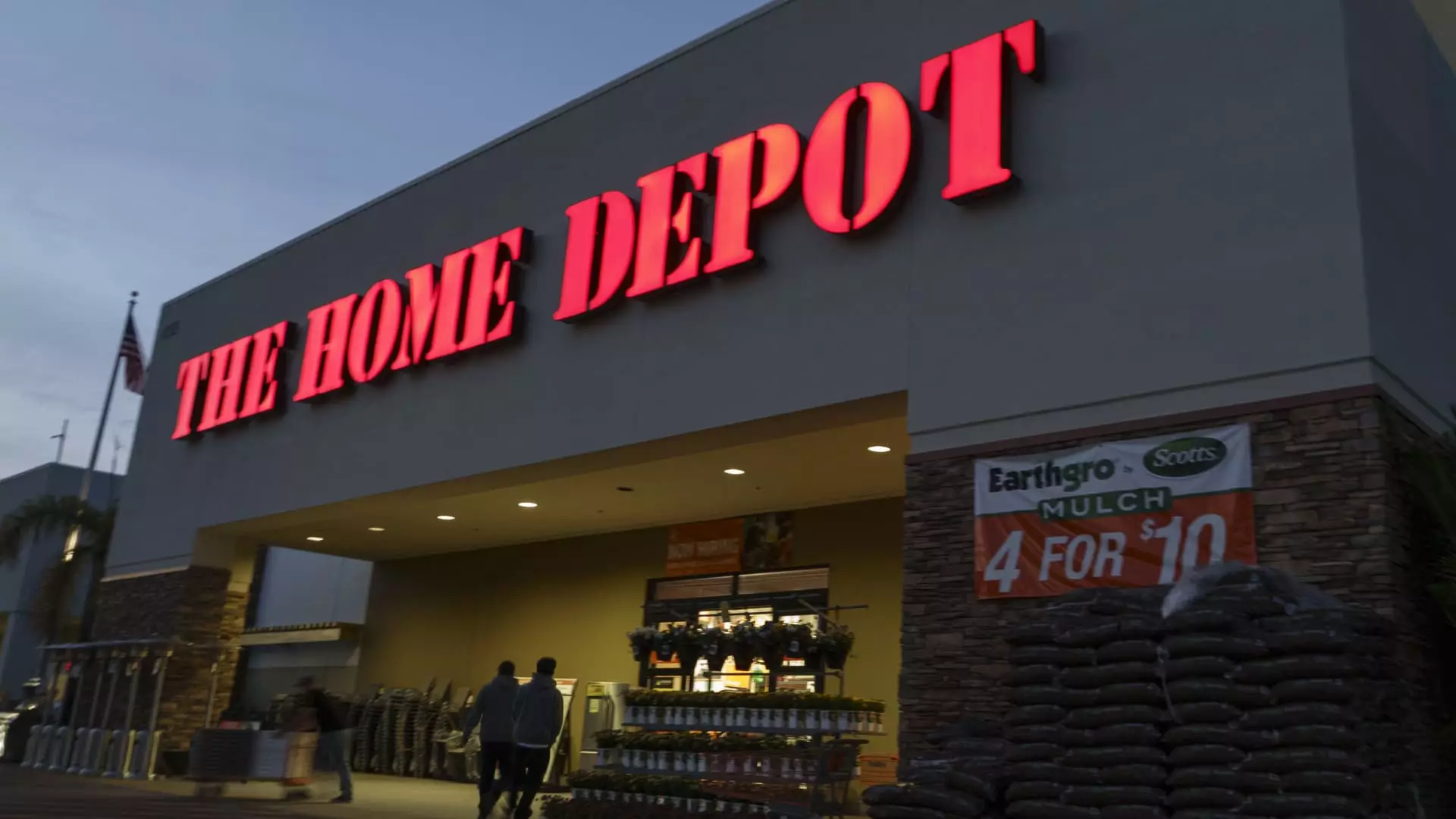Investors have recently found themselves at the intersection of uncertainty and opportunity as economic indicators continue to shape the financial landscape. The ongoing sagas of tariffs and fluctuating earnings from major U.S. companies cast a shadow over market sentiment, creating a volatile backdrop for investors. Despite these challenges, there remains a beacon of hope in the form of dividend-paying stocks—those rare gems in a turbulent sea of unpredictability. By focusing on financially stable companies that can consistently return cash to shareholders, investors may not only protect their portfolios but also uncover potential for growth.
Home Depot: A Steady Force in Adversity
One significant player worth noting is Home Depot (HD), a household name synonymous with home improvement. The company recently presented its first quarter results for fiscal 2025, revealing a mixed bag of outcomes. Still, despite the market’s ups and downs, Home Depot chose to reaffirm its full-year guidance—a gesture of confidence that resonates well in the current climate. With a solid dividend of $2.30 per share set to be paid out this June, the company offers a commendable annual yield of approximately 2.5%.
Greg Melich, an analyst from Evercore, is particularly bullish about Home Depot’s outlook. He has reiterated a buy rating, emphasizing that the risk/reward profile is favorable. Home Depot has taken critical steps to stabilize its operation, including addressing concerns over inventory shrinkage and enhancing online sales—a critical pivot in today’s digital age. Melich’s insights suggest that there is an underlying strength in Home Depot that could position it as an industry leader, potentially capable of mirroring the success of giants like Costco and Walmart in upcoming years.
It’s not just about numbers; it’s about the narrative surrounding Home Depot. The company’s commitment to keeping prices stable in the face of tariff-induced pressures reveals a thoughtful strategy aimed at retaining consumer trust. In an era where price wars and austerity often dominate discussions, this steadfastness could be a defining characteristic that shields Home Depot from more profound repercussions.
Diamondback Energy: Embracing Caution in Uncertain Waters
Turning our attention to the energy sector, Diamondback Energy (FANG) stands out not merely for its operational capabilities but for its strategic decision-making amidst fluctuating commodity prices. The independent oil and gas company revealed better-than-expected first-quarter earnings, showcasing an operational depth that many competitors might envy. However, in a prudent move reflective of current market realities, Diamondback has curbed its full-year activity while emphasizing free cash flow generation—a smart choice that highlights the importance of sustainability in the modern investment landscape.
RBC Capital analyst Scott Hanold has reaffirmed his buy rating on Diamondback stock and sees the company’s ability to return capital to shareholders—reaching nearly $864 million in Q1 2025 through dividends and buybacks—as a testament to its financial health. In these times of uncertainty, such levels of shareholder returns highlight a refreshing commitment to investors, transforming Diamondback from just another oil company into a model of operational foresight.
In the methodology of personal finance, Diamondback’s lower capital spending while maintaining production stability positions it as a harbor for investors seeking reliable returns. Furthermore, as the modern investor becomes increasingly wary of market risks, companies like Diamondback which maintain robust cash flows and rewards to shareholders can empower a portfolio’s overall resilience.
ConocoPhillips: Navigating the Choppy Realities of Oil
In similar fashion, ConocoPhillips (COP) has illustrated commendable adaptive strategies in a choppy market. The oil and gas exploration firm has not shied away from the realities of a volatile macro environment, adjusting its overarching strategies while still delivering market-beating earnings. By returning a staggering $2.5 billion to shareholders while cutting back on capital expenditure, ConocoPhillips has demonstrated both fiscal prudence and a dedication to maintaining shareholder value—qualities that undoubtedly resonate with the wariness of many investors in today’s economy.
Goldman Sachs analyst Neil Mehta shares a positive perspective on ConocoPhillips, underscoring the company’s ability to successfully weather the storm of economic uncertainty. He notes that while OPEC+ production cuts may introduce additional pressures, ConocoPhillips remains bullish in the long term—juggling breakeven costs and LNG expenses efficiently. The prospect of COP’s breakeven costs shifting lower over time would offer a strategic advantage, enabling better profitability as conditions stabilize.
Investors, particularly those aligned with center-wing liberal ideals, may find solace in ConocoPhillips’ commitment to sustainability and balance, assessing growth while ensuring returns in an enlightened manner. The company embraces not just profitability but also responsibility—a trait crucial in an era of heightened environmental and social awareness among stakeholders.
In a world where chaos often reigns, the resilience exhibited by these dividend stocks offers hope. Each company demonstrates a commitment to restoring investor confidence through innovative strategies and careful cash management. Whether through enhancing customer loyalty, prioritizing shareholder returns, or adapting to changing market forces, these companies illustrate that even amidst uncertainty, the enduring spirit of investment can prevail.

